Last month, I witnessed an innovation in Manhattan perhaps better left un-invented, though my daughter loved the idea. It was a cupcake ATM, not far from the hotel where we stayed while looking at colleges. A cupcake ATM is just as it sounds. Walk up, punch a few buttons, swipe Mom’s credit card, and out pops a cupcake in a tiny cardboard box.
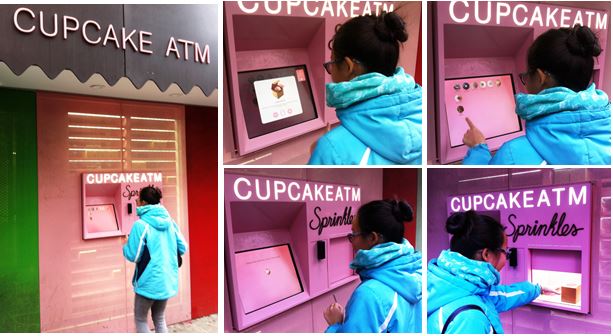 This seemed wrong on so many levels.
This seemed wrong on so many levels.
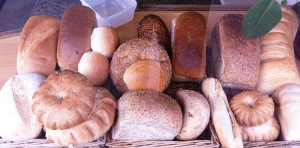 Where is the anticipation of walking into a bakery filled with choices? Where is the bliss of smelling the freshly baked breads, cookies, and pastries? Seeing the variety, all lined up in the glass case in front of you and on the shelves behind the bakers? What about the banter with the lady behind the counter? The chance to ask questions? Watching the lady lift your specific choice with that small piece of waxy paper – no, that one over there – and carefully place it in a white paper bag?
Where is the anticipation of walking into a bakery filled with choices? Where is the bliss of smelling the freshly baked breads, cookies, and pastries? Seeing the variety, all lined up in the glass case in front of you and on the shelves behind the bakers? What about the banter with the lady behind the counter? The chance to ask questions? Watching the lady lift your specific choice with that small piece of waxy paper – no, that one over there – and carefully place it in a white paper bag?
The cupcake ATM was a disturbingly long way from my bakery experiences as a child. Our local bakeries were dotted all over town, right in residential neighborhoods. Yindra’s was Czech and had the best kolaches; another was famous for wedding cakes. My personal favorite was the Fronk’s Bakery, because Mrs. Fronk was my fourth-grade teacher, my favorite teacher. Sometimes she’d give me a free cookie. Our town was populated mostly with central Europeans so the bread tended to be mostly wheat, pumpernickel, farmer’s, and rye – with and without caraway seed. Occasionally we’d see the exotic French, Vienna, or sourdough. Nowadays, local bakeries are largely replaced by grocery chains with their bakery departments and prepackaged breads made who knows where. We’ve lost an important social connection.
But even worse, it is one more step down the path toward disconnection from the source of our food and the land that produced it. Even as a kid, I understood that Mrs. Fronk used ingredients like flour and eggs and milk to make the cookie she gave to me, and fresh raspberries to dot the cake in the window. And I knew that those ingredients came from food grown on local farms. I knew people who had chickens (my Aunt Emma), and grew raspberries (my grandmother and, later, Mom and Dad). As a young man, my grandfather had a threshing machine, traveling around Manitowoc County helping farmers thresh their grains.
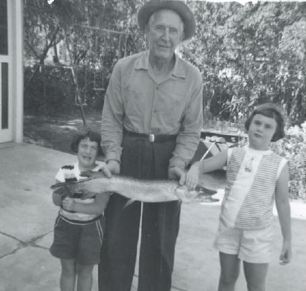 Every year, my dad ordered a half a cow from a farmer friend. The local butcher cut it into manageable pieces, and delivered it to our house in large metal pans. But it was we, as a family, that wrapped the slabs of meat in white butcher paper, weighed out the hamburger into 2 pound packages, and labeled everything before placing it all in the freezer.
Every year, my dad ordered a half a cow from a farmer friend. The local butcher cut it into manageable pieces, and delivered it to our house in large metal pans. But it was we, as a family, that wrapped the slabs of meat in white butcher paper, weighed out the hamburger into 2 pound packages, and labeled everything before placing it all in the freezer.
Dad and Grandpa fished Lake Michigan regularly, not for pleasure, but to put food on the table. We ate whatever they caught. To this day, I would take a plate of fried Lake Perch over any kind of fish or seafood.
We had big gardens and we canned tomatoes, pickles, beets, even sauerkraut. In my first job as a kitchen helper at the Manitowoc County Hospital, I canned hundreds of jars of pickles from cucumbers grown in the big county garden. Multiple times a week, I helped bake bread for 500 patients. I picked raspberries in the vast gardens and served them to patients for supper each night while the picking was good. I was blessed to know where food came from.
The average American family consumes more “food” from boxes and cans than fresh. Now there are children that think cupcakes come from ATMs and believe that supper comes from a fast food place – but not much beyond that. They don’t understand the connection to the land and the people who grew the food.
 On the Big Island, we get that connection at a deep level. We talk a lot about food. Being on an island, we worry about disruptions to our food supply, because we cannot sustain ourselves for very long without the barges. So we think about food and how to improve our sustainability. We’ve had lots of conversations about stopping GMO crops here, and our County Council managed to pass a ban on all new GMO plantings. It’s under dispute, but that’s to be expected.
On the Big Island, we get that connection at a deep level. We talk a lot about food. Being on an island, we worry about disruptions to our food supply, because we cannot sustain ourselves for very long without the barges. So we think about food and how to improve our sustainability. We’ve had lots of conversations about stopping GMO crops here, and our County Council managed to pass a ban on all new GMO plantings. It’s under dispute, but that’s to be expected.
This passion about food make us appreciate it. Many of us garden and we share produce. There’s an intensity of interest in food here that didn’t exist in any other place I’ve lived. We love fresh food and we value the land on which it grows. We appreciate Earth. We know she is our Mother.
Food for thought on Earth Day.
If you like my blog, you’ll enjoy my book, Manifesting Paradise, available on Amazon. Receive my posts automatically by filling in your email address in the “follow” box at the top of the right column. And please join my mailing list.

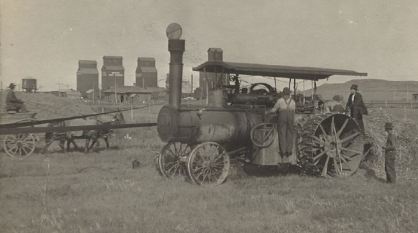
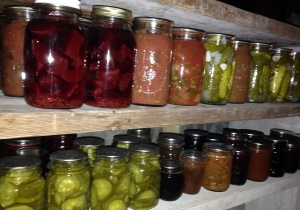
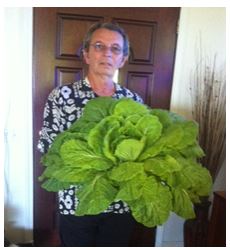




Love this article. Thanks Diane for another thoughtful and inspiring post.
Dear Dianne, I think you also like it because it has a pix of your hubby. Tell him thank you for the picture! (And thank you for sharing your eggplant – making it tonight for supper.)
That too, but I wasn’t going to mention it 😉
Love this blog, and happy to contribute the picture. We are ever grateful to Mother Earth for the bounty she provides. There’s nothing better than a Nana pickle, and the happy little faces crunching them!
You and Vitmer are my heroes when it comes to living off the land.
Thank you. It’s very rewarding on so many levels.
Excellent blog. I finally completed my bromeliad garden (among other things). Wait til you see it. Mahalo!
Thank you Malia. I am looking forward to seeing your new bromeliad garden. I still have some more – green leaves with red tips and purple flowers. Let me know if you want some more.
One of those would be very nice… mahalo!
Diane,
Thank you for the stroll down memory lane, I am also from Manitowoc and remember all the bakeries you mention and a childhood much like you describe. A wonderful, thought provoking article.
Dear Holly, Thank you for the comment. I’ve been seeing lots of views of this essay in the last three days. Is it making the rounds in Manitowoc? Just wondering. Aloha, Diane
It’s fun to read some of the old essays and the responses.
Yes, though I can see how my writing has improved over the years. Sometimes it’s painful to reread the old stuff.